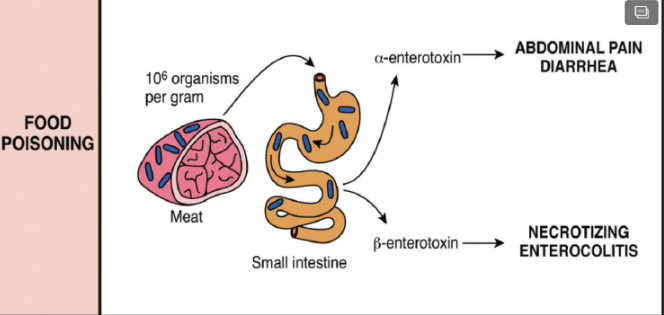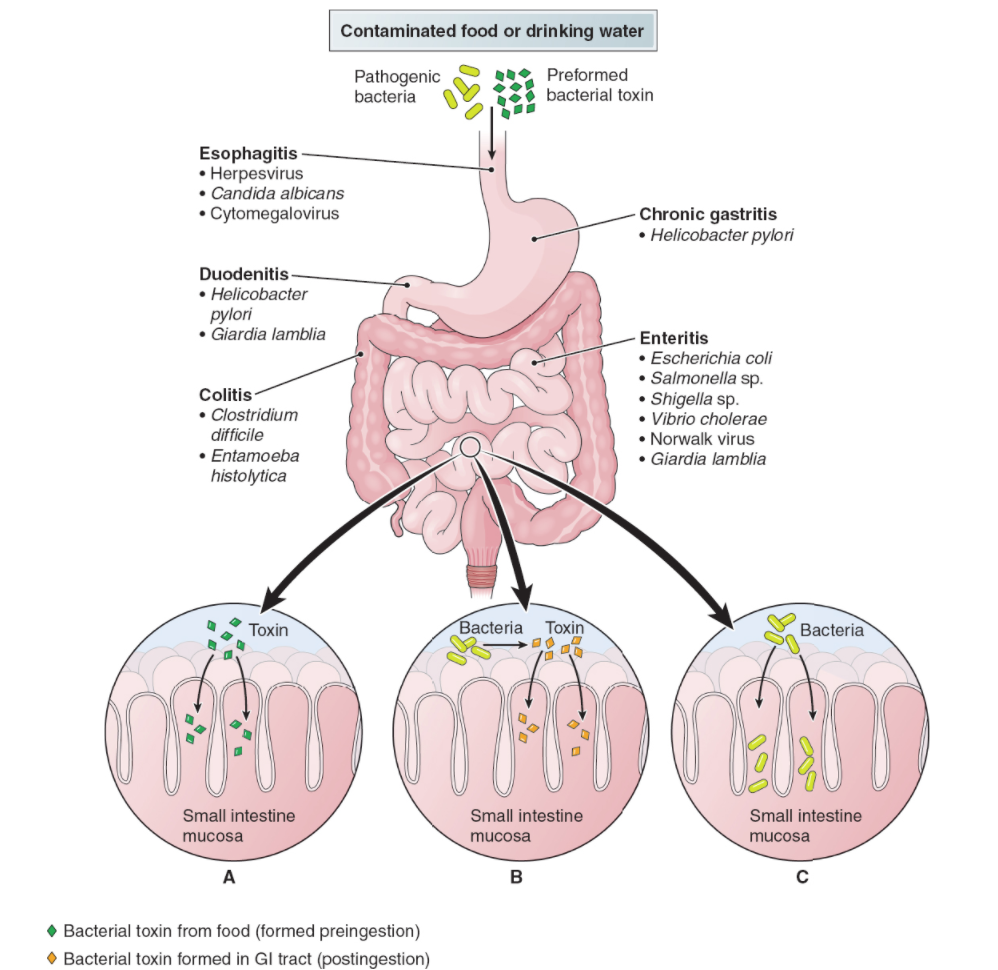On page 13 of Shekalim we read about the fifteen Temple officers and the administrators who held them:
שקלים טו, א
…אֵילּוּ הֵן הַמְמוּנִּין שֶׁהָיוּ בַּמִּקְדָּשׁ. יוֹחָנָן בֶּן פִּינְחָס עַל הַחוֹתָמוֹת. אֲחִייָה עַל הַנְּסָכִים. מַתְיָה בֶּן שְׁמוּאֵל עַל הַפְּייָסוֹת…בֶּן אֲחִייָה עַל חוֹלֵי מֵעַיִם
These are the officials who served in specific positions in the Temple: Yochanan ben Pinchas was responsible for the seals. Achiyya was responsible for the libations, while Ben Achiyya was responsible for the treatment of those Cohanim who had an intestinal disorder…
The Talmud then explains the nature of these intestinal disorders:
שקלים טו, ב
בֶּן אֲחִייָה עַל חוֹלֵי מֵעַיִם. עַל יְדֵי שֶׁהָיוּ הַכֹּהֲנִים מְהַלְּכִין יְחֵיפִים עַל הָרִצְפָּה וְהָיוּ אוֹכְלִין בָּשָׂר וְשׁוֹתִין מַיִם הָיוּ בָאִין לִידֵי חוֹלֵי מֵיעַיִם. וַהֲוָה יְדַע אֲהֵײ דֵין חֲמַר טַב לִמְעַייָא. וְהֵיי דֵין חֲמַר סְמַס לִמְעַייָא
Clostridial diarrheal infections. Meat dishes left to cool at room temperature grow large numbers of clostridia. When contaminated meat is ingested, C. perfringens types A and C produce alpha-enterotoxin in the small intestine during sporulation, causing abdominal pain and diarrhea. Type C also produces beta-enterotoxin botulism. From Harwood-Nuss’ Clinical Practice of Emergency Medicine. Kluwer 2021. Chap 115.
Ben Achiyya was appointed to treat those priests who suffered from intestinal disease: Since the priests would walk barefoot on the floor [even when it was cold, as their feet had to be in contact with the stones of the Temple floor,] and since they would eat a lot of meat from the offerings and drink a lot of water, they would contract intestinal disease. And Ben Achiyya knew that which particular type of wine was good for healing the intestines, and which type of wine was would be bad for the bowels.
Pity the Poor Cohen
It would seem then, that an upset stomach was one of the perils of the job for a Cohen called to service in the Temple. Elsewhere we have noted that the tribe of the Cohanim (pl. of Cohen) were likely to suffer from a number of different ailments including vertical diplopia (most commonly caused by damage to the fourth cranial nerve, called the trochlear nerve), nystagmus, liver disease (with gynecomastia, ascites and testicular atrophy) and depression. Some also had syndactyly, a condition in which some of the fingers or toes are fused together. That condition is genetic, but some of the other Cohen associated ailments can be explained by chronic alcohol misuse.
The causes of Gastroenteritis
It would seem that when they came to Jerusalem to serve, the Cohanim would often contract gastroenteritis, an inflammation of the gastrointestinal tract. It is a common set of conditions, and I must have treated many hundreds of people with the condition over my decades as an emergency physician (though even when working in Jerusalem, I never once made the association with the Temple service, nor asked if the patient has the risk factor of being a Cohen. Woops). The patient feels weak, and there is vomiting and loose or watery diarrhea. If the patient does not (or cannot) drink enough fluids, she can become dehydrated, and feel dizzy. In most cases the condition is self-limiting, and lasts only a day or so.
There are dozens and dozens of causes of gastroenteritis, most of which are viral. Sometimes the infectious agent produces a toxin on foods which is then ingested. In other cases the toxin is produced once the virus or bacteria have been ingested, though it doesn’t make much difference to the patient in the ER. Or the Cohen in the Temple.
Mechanisms of infectious diarrhea illness. Note that pathogens can produce an enterotoxin in food prior to ingestion. That is what gives you food poisoning. They can also produce a toxin in the intestines after ingestion, which can cause a non-bloody diarrhea (e.g., V. cholerae) or bloody diarrhea (e.g., C. difficile). From From Harwood-Nuss’ Clinical Practice of Emergency Medicine. Kluwer 2021. Chap 115.
And here, for your delight is a list of some of the agents that cause gastroenteritis, and which Ben Achiyya would have had to treat. With wine.
F=Fever, AP= Abdominal Pain, NV=Nausea and vomiting, BD= Blood diarhhea. From From Harwood-Nuss’ Clinical Practice of Emergency Medicine. Kluwer 2021. Chap 159.
Walking Barefoot, Eating meat and Gastroenteritis
In today’s page of Talmud, the upset stomachs suffered by the Cohanim is blamed on three things: walking barefoot, eating meat and drinking water. Let’s take a look and figure out if what, culpability if any, each of these had.
Walking Barefoot - מְהַלְּכִין יְחֵיפִים עַל הָרִצְפָּה
Can walking barefoot lead to gastroenteritis? No. So that is easy.
Eating Meat - אוֹכְלִין בָּשָׂר
Is there a relationship between eating meat and gastroenteritis? Why yes, certainly there is. In the table above you can see that a bacteria called Yersinia is a common etiological agent. Among its favorite hiding places are raw and undercooked meat, especially if that meat was contaminated with urine or feces. According to the CDC, “Y. enterocolitica causes almost 117,000 illnesses, 640 hospitalizations, and 35 deaths in the United States every year. Children are infected more often than adults, and the infection is more common in the winter.” Another bacteria that can cause a meat related enteritis is salmonella (though it is more commonly associated with eggs and poultry). As the World Health Organization likes to remind us:
Salmonella bacteria are widely distributed in domestic and wild animals. They are prevalent in food animals such as poultry, pigs, and cattle; and in pets, including cats, dogs, birds, and reptiles such as turtles. Salmonella can pass through the entire food chain from animal feed, primary production, and all the way to households or food-service establishments and institutions.
Drinking Water - וְשׁוֹתִין מַיִם
Contaminated drinking water is a well-established and still very prevalent cause of acute gastroenteritis. In a review of the problem published in Water and Health, the authors note that “transmission by food or water has been documented for astroviruses, caliciviruses, rotaviruses, and norovirus…Conservative estimates put diarrhea in the top five causes of deaths worldwide with 3.5 to 5 million deaths every year and most occurring in young children in non-industrialized countries. According to the World Health Organization (WHO), diarrheal diseases account for 4.1 % of the total DALY global burden of disease of which 88% is attributable to unsafe water supply, sanitation, and hygiene.”
In tractate Yoma (19a) we learn that all of the water in the Temple came from but a single well, known as the בור הגולה – “The Well of the Diaspora.” That was a dangerous practice since should it become contaminated, everyone who drank from it could become sick. It would have been better (from a public health perspective) for some of those who served in the Temple to have used a second water source.
Here are just some of the the nasty pathogens that can contaminate the water supply.
From Griffiths, J. Waterborne Diseases. In The International Encyclopedia of Public Health, 2nd edition, Volume 7, 395.
The Prohibition against eating Sacrificial Meat left out for too long
It is interesting to note that there is a biblical prohibition called Nossar (נותר) against eating sacrificial meat outside of its proscribed time. The Torah outlines the prohibitions in several places. Here are some of them:
The Paschal Lamb (Ex. 12.10):
וְלֹא־תוֹתִ֥ירוּ מִמֶּ֖נּוּ עַד־בֹּ֑קֶר וְהַנֹּתָ֥ר מִמֶּ֛נּוּ עַד־בֹּ֖קֶר בָּאֵ֥שׁ תִּשְׂרֹֽפוּ׃
You shall not leave any of it over until morning; if any of it is left until morning, you shall burn it.
The Festival Offering (Deut. 16:4)
וְלֹא־יָלִ֣ין מִן־הַבָּשָׂ֗ר אֲשֶׁ֨ר תִּזְבַּ֥ח בָּעֶ֛רֶב בַּיּ֥וֹם הָרִאשׁ֖וֹן לַבֹּֽקֶר׃
For seven days no leaven shall be found with you in all your territory, and none of the flesh of what you slaughter on the evening of the first day shall be left until morning.
The Thanksgiving Offering (Lev. 22:30)
בַּיּ֤וֹם הַהוּא֙ יֵאָכֵ֔ל לֹֽא־תוֹתִ֥ירוּ מִמֶּ֖נּוּ עַד־בֹּ֑קֶר אֲנִ֖י ה׳׃
It shall be eaten on the same day; you shall not leave any of it until morning: I am the LORD.
The Shelamim Offering (Lev. 7:15)
וּבְשַׂ֗ר זֶ֚בַח תּוֹדַ֣ת שְׁלָמָ֔יו בְּי֥וֹם קָרְבָּנ֖וֹ יֵאָכֵ֑ל לֹֽא־יַנִּ֥יחַ מִמֶּ֖נּוּ עַד־בֹּֽקֶר׃
And the flesh of his thanksgiving sacrifice of well-being shall be eaten on the day that it is offered; none of it shall be set aside until morning.
Meat that is properly roasted is less likely to contain pathogens or toxins that cause gastroenteritis. But in a Middle-Eastern climate and without refrigeration, that meat would very quickly spoil and become contaminated with all sorts of pathogens. From the perspective of good food hygiene, disposing of it within a few hours of cooking was an extremely important measure to prevent the kinds of illnesses the Cohanim seemed to catch all too often. And the while the wine that Ben Achiyya could not cure any gastroenteritis, at least its alcohol content meant that it was itself not likely to contain the pathogens found in natural water supplies.
“From the very
beginning there has been something unhealthy about these priestly aristocracies and in the customs dominant there, which are turned away from action and are partly brooding and partly emotionally explosive, resulting in the almost inevitable bowel complaints and neurasthenia which have plagued the clergy down the ages ”
Today, we take proper food hygiene for granted, and are fastidious about washing both our hands and our food. We expect meat and vegetables to be free of bacteria, and when there are outbreaks of food-born illnesses they often make the national news, like one did just two days ago. We take such luxuries for granted, but as today’s page of Talmud reminds us, we should not do so. For much of the world’s population, clean drinking water and plentiful safe food are still not guaranteed. Be grateful for your plenty, and be grateful that you did not need to serve as a Cohen in the Temple.





